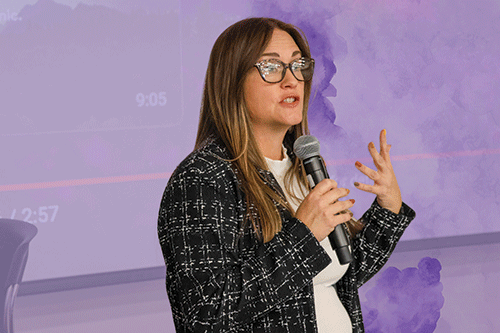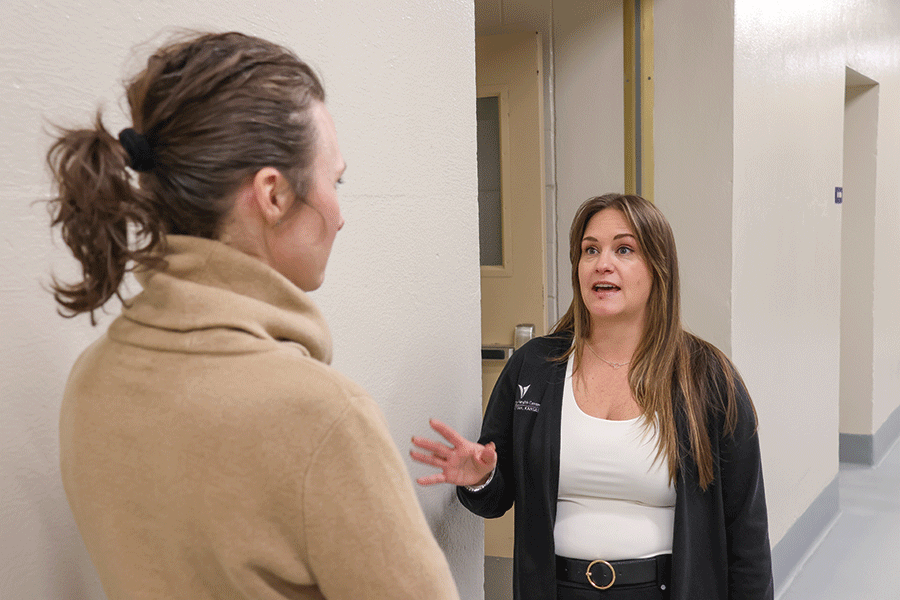Caring for Every Heart
How veterinary social work supports mental health and human-animal bonds.
Story and photos by Rylee Coy
Top photo caption: Cassidy interacts with students in the beginning of the shelter medicine group.
The VHC's veterinary social worker Cassidy Moreau leads a mindfulness exercise at the beginning of a class at CVM.
The deep bond between humans and animals can provide comfort in some of life’s most challenging moments. For Cassidy Moreau, veterinary social worker at the Veterinary Health Center, this connection has been a cornerstone of her career. With a background in social work, Cassidy has held various roles that placed her at the intersection of emotional support and human-animal relationships. Now, as the first veterinary social worker the Veterinary Health Center has had, she combines her passion for mental health advocacy and animal welfare to help both people and animals navigate grief, loss and stress.
Educational and Professional Background
Cassidy previously has been in several positions pertaining to social work, including an outpatient therapist, homeless case manager for Veteran Affairs and a school social worker. The commonality between each is the vital role animals play in emotional support and healing for those facing hardships.
“My career as a social worker has always been driven by the understanding of the deep connections between humans and their environments, including the powerful human-animal bond,” Cassidy says.
In May 2022, Cassidy was invited to speak to students enrolled in the community outreach elective rotation, taught by Dr. Ron Orchard, a postdoctoral fellow with the Shelter Medicine and Community Outreach program. She shared her experiences working with unhoused individuals, those living with substance use and individuals with metal health concerns.
“What began as a one-time speaking engagement grew into an ongoing partnership where we collaborated on developing a curriculum that best serves the students,” Cassidy says. “Through our work together, we were able to craft a unique approach to community outreach, focusing on practical applications that bridge veterinary medicine and social work.”
Realizing Dr. Orchard and Cassidy shared a vision for expanding the student’s understanding of social issues also allowed Cassidy to see her next step for a future career.
“This opportunity opened my eyes to a whole new way of integrating social work into veterinary medicine,” Cassidy says. “Having always believed in the therapeutic potential of the human-animal bond, I knew this specialty aligned perfectly with my passion for advocating for both people and animals.”
Cassidy started the veterinary social work certification program at the University of Tennessee in Jan. 2023. She received training in animal related interactions and experiences, the link between harm to humans and animals, animal related grief and bereavement and intentional well-being.
While in the program, the Veterinary Health Center announced they were looking for their first veterinary social worker.
“I knew this was the perfect next step for me,” Cassidy says. “This gave me a chance to combine my background in social work with my passion for mental health advocacy, animal welfare, and client support.”
Cassidy talks to faculty member, Dr. Emily Reppert in the VHC.
Veterinary Social Work at K-State
In Cassidy’s role, she supports a lot of different positions within the Veterinary Health Center. One part of her job is making sure faculty, staff and fourth-year students on rotations are being intentional with their well-being. Cassidy also assists with crisis management when needed for those working in the VHC.
“I support faculty and even the fourth-year students in the hospital on their clinical rotation,” Cassidy says. “That could look like offering some crisis management if there's like a difficult day or difficult case and stepping in to help them with communication with clients. Sometimes clients may not want to talk with me, but I can help support the clinicians or staff working with them.”
Cassidy provides client support, assistance with grief and loss and when clients need additional resources, like food and financial support. She helps clients with grief, intentional well-being and animal assistance interventions.
Mental Health Awareness
“The most important thing I do is the mental health aspect,” Cassidy says. “If I am working with a client, that is taking a stressor off our students, faculty and staff. I also help with the social emotional piece because that is where my training comes from. This allows for our students, faculty and staff to focus on patient care.”
Cassidy believes this not only leads to better patient care, but to fighting burnout compassion fatigue in students, staff and faculty.
“The suicide rates in veterinary medicine are very high,” Cassidy says. “According to a special report published in 2019 titled “Suicide Among Veterinarians in the United States From 1979 Through 2015,” rates for females are 3.5 times more likely than the general population and for males it is about 2.5 times more likely. We need to normalize the conversation about this and be more intentional.”
Cassidy wants people to know that support exists. If she is not able to assist, she can refer them to someone who can help.
“We need to let people know they are not fighting in the dark,” Cassidy says. “They have someone here that can assist them.”
Paws of Comfort - A grief support group
Cassidy provides grief support in individual and group settings through the Paws of Comfort program. This program typically comprises clients of the VHC and is available to members of the public. Participants do not have to go through animal loss, it can also be end-of-life grief.
“Animal loss is often not seen in society as a normal loss that we would experience if we were to lose a human family member,” Cassidy says. “For a lot of people that bond between them and their animal companion is a very strong bond, and society doesn't recognize that as a whole, people have a lot of difficulty going through that grieving process.”
What to expect
Participants are screened before starting the program to ensure groups are cohesive. Meetings generally include some form of memorialization and a space to share with others going through similar things. Participants can expect to leave with tools to navigate grief.
“Grief comes in waves and in different forms,” Cassidy says. “I want folks to have some tangible tools that they can use to kind of help navigate that grief. There are a lot of book recommendations and different things that are useful tools and some ideas of how to memorialize the life that was lost.”